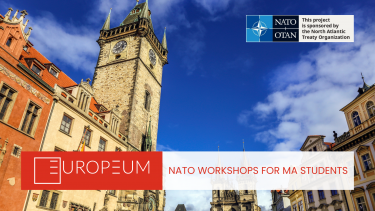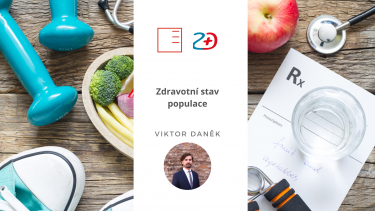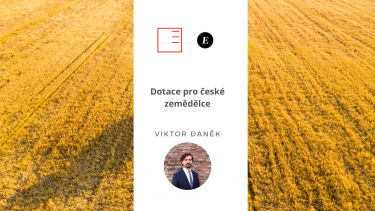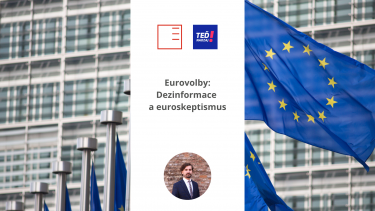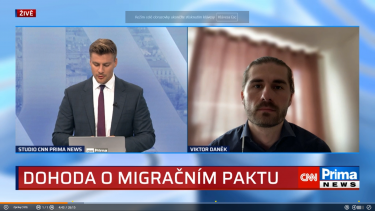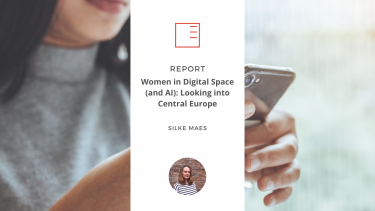Call for Participants: Euro-Atlantic Future of Ukraine and Eastern Europe: Views from Visegrad
Are you a Master’s student from the Czech Republic, Hungary, Poland, Slovakia keen on international relations and NATO's strategic future? Join our workshop series to engage with experts, present your views on NATO’s Open-Door policy, and network with peers from the region.
Show more
Zdravotnický deník | Population Health
Politicians and companies should start putting more emphasis on prevention and education about active and healthy lifestyles, because the health of the population has a major impact on the competitiveness of companies and the national economy. Viktor Daněk, Deputy Director of EUROPEUM Institute, commented on this issue.
Show moreEkonomický deník | Subsidies for Czech farmers
Farmers in the Czech Republic receive the fifth largest package of national subsidies in the European Union, behind Poland, Germany and Austria. Moreover, the whole system is set up in such a way that small farmers often do not receive subsidies at all. According to Viktor Daňek, deputy director of EUROPEUM Institute, the system cannot function fairly without a cap or a significant degression in payments.
Show moreTeď naozaj! | EU elections: Disinformation a euroscepticism
What are the trends in the campaigns for the European elections? What disinformation is circulating in the public space about the European Union? What are the reasons for the strong euroscepticism in the Czech Republic? Viktor Daněk, Deputy Director in the Institute EUROPEUM answered these and other questions in the Czech-Slovak podcast "Teď naozaj!".
Show moreCNN Prima News | EU member states confirm agreement on final migration pact
Representatives of the EU Member States in Brussels confirm their agreement on the final form of the migration package. The Czech Republic reportedly abstained from voting, while Hungary and Poland opposed it. Viktor Daněk, Deputy Director of EUROPEUM Institute, commented on the final form of the migration pact.
Show moreReport | Women in Digital Space (and AI): Looking into Central Europe: cases from Austria, Czechia, Poland and Slovakia
Our researcher Silke Maes in her latest report addresses issues of cyberviolence on women and examines whether women in the CEE benefit from digitalisation (and AI). The report looks into how women use and contribute to the digital space, examines opportunities and challenges and proposes recommendations for a more inclusive digital space.
Show moreČRo Plus | Visit of Jens Stoltenberg and Rishi Sunak to Poland
Donald Tusk was joined in Warsaw by NATO Secretary General Jens Stoltenberg and British Prime Minister Rishi Sunak. The aim of this meeting, according to Tusk, is to strengthen Poland's position in security policy. Polish President Andrzej Duda has even said that Poland is willing to let NATO allies deploy nuclear weapons on their territory. Martin Vokálek, director of the EUROPEUM Institute, commented on the visit for Czech Radio.
Show more
Think Visegrad Fellowship offer: Call for proposals 2024
The Think Visegrad platform, which brings together think tanks from the Visegrad countries, including the EUROPEUM Institute for European Policy, is offering eight visiting fellowships to non-Visegrad expert fellows for the period Summer/Autumn/Winter of 2024. The duration of fellowships varies from 6 to 8 weeks (based on agreement with the hosting institute).
Show moreRILSA | The uncertain fate of the Green Deal for Europe ahead of the European Parliament elections
Farmers' protests have reminded that the measures of the Green Deal for Europe may not be politically viable for Europeans. To make climate policies politically viable, the EU should therefore focus on its commitment not to leave anyone behind in the green transition. Klára Votavová, a researcher at EUROPEUM Institute for European Policy, discusses the current development of the Green Deal for Europe and its social policy aspects in an expert publication for the Social Policy Forum.
Show moreDeník N | Will the rotation in NATO leadership involve the Czech Republic and Eastern Europe?
This year will see the expected renewal of top posts in NATO and, after the European Parliament elections, also in the European Union. These positions are traditionally filled by candidates from the wealthy countries of Western and Southern Europe, and to a lesser extent Northern Europe. The countries of Eastern and Central Europe have so far, even after years of membership, still been overlooked. Poland is the only country from the region to have been awarded one of the bloc’s senior positions in the past with Donald Tusk and Jerzy Buzek leading the European Council and European Parliament respectively. Viktor Daněk, deputy director of the EUROPEUM Institute, spoke about the selections of candidates for Deník N.
Show moreStaroměstské náměstí 4/1
Prague 1 - Staré Město
110 00
tel.: +420 212 246 552
email: europeum@europeum.org
https://www.europeum.org
